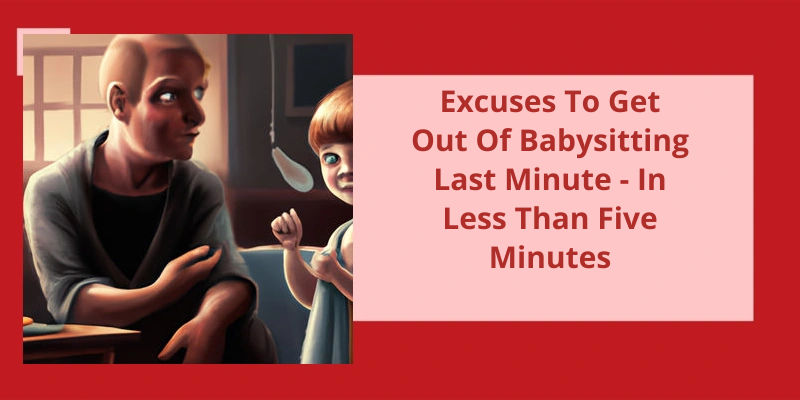However, sometimes we all need a break, whether it's to catch up on much-needed rest, take care of personal matters, or simply have some time for ourselves. To politely decline babysitting duties in less than five minutes, the key is to come up with a legitimate excuse that doesn't raise any suspicions. One effective approach is to mention that you’re busy or not feeling well, omitting the fact that the busyness will involve some quality rest in bed or that feeling sick might actually be a strong reason to decline babysitting responsibilities. By employing these discreet strategies, you can gracefully opt out of babysitting without causing any unnecessary alarm or stress to your babysitting family.
How Do You Tell a Babysitter You No Longer Need Them?
When it comes to breaking the news to a babysitter that you no longer need their services, it’s essential to handle the situation with empathy and respect. One approach is to schedule a time to have an honest conversation with the babysitter. This conversation can take place at the end of a typical babysitting shift or even during a separate meeting. It’s crucial to ensure that the babysitter doesn’t feel overwhelmed or ganged up on during this discussion.
Consider the emotional impact this news may have on the babysitter, so having someone present for moral support is a thoughtful idea. However, it’s essential to create an environment where the babysitter feels that their thoughts and feelings are respected. This conversation should focus on mutual understanding and open communication, allowing both parties to express their thoughts and concerns.
When discussing the decision to part ways, it’s important to be clear and straightforward about the reasons behind it. Whether it’s due to a change in schedule, financial constraints, or other unforeseen circumstances, expressing this in a respectful and concise manner is vital. Remember to approach this conversation with understanding, acknowledging the babysitters hard work and contributions to your family.
Moreover, be prepared to answer any questions the babysitter may have and listen actively to their perspective. Understand that they may have invested time and effort into the position and that their feelings may be hurt by this decision. Express gratitude for their services and offer to provide a positive recommendation or referral if appropriate. Ultimately, handle the conversation with empathy, respect, and open communication to make the transition as smooth as possible for both parties involved.
How to Find a Replacement Babysitter
When you need to find a replacement babysitter at the last minute, there are a few options you can try. Start by asking family or close friends if they’re available to help out. If that’s not possible, consider reaching out to trusted neighbors or parents from your child’s school or extracurricular activities. Another option is to look for babysitter or nanny services in your area that offer emergency or last-minute bookings. Websites and apps dedicated to connecting parents with caregivers may also have available sitters on short notice. Finally, you can try posting on local community forums or parent groups to see if anyone is available to help out. Remember to always check references and conduct interviews or background checks to ensure the safety and suitability of the replacement babysitter.
Sometimes, there may come a time when you need to decline a babysitting request. While it can be difficult to say no, there are valid excuses that can be used. Saying that you’re busy or not feeling well are common and acceptable reasons.
What Is a Good Excuse to Not Babysit?
When it comes to finding a good excuse to not babysit, it’s important to strike a balance between being believable and respectful. One option is to simply state that you’re busy and unable to commit to babysitting at that particular time. This allows you to maintain your privacy while also expressing your inability to fulfill the role.
However, if you want to convey a stronger reason for not being able to babysit, telling the family that youre not feeling well can be an effective excuse. Feeling sick is something that most people can relate to, and it’s often seen as a valid reason to cancel plans. By expressing that you’re unwell, you can convey the urgency of the situation and the necessity for your absence.
Of course, it’s important to be honest when using this excuse. You don’t want to falsely claim sickness and then be caught in a lie later on. As such, if you choose to use this excuse, it’s best to be prepared for potentially being asked about your symptoms or when you’ll be available again.
Remember, communication is key when it comes to backing out of a babysitting commitment. Be polite, understanding, and respectful in your explanation. By conveying your unavailability or illness in a considerate manner, you’re more likely to maintain a good relationship with the family and avoid any unnecessary conflicts.
Source: What’re some good excuses not to babysit your …
However, there are some situations where not having a babysitter can be a valid reason for missing work. It’s essential to consider individual circumstances and alternative childcare options before using this as an excuse.
Is Not Having a Babysitter a Good Excuse to Miss Work?
Not having a babysitter may be an inconvenience, but it isn’t a legitimate excuse to miss work. In todays society, there are countless resources available to find reliable childcare options. Many people have access to relatives, friends, or neighbors who’re willing to lend a helping hand in watching their children. Additionally, registered nurseries and daycare centers offer services for working parents, ensuring that their children are in a safe and nurturing environment.
While it’s understandable that emergencies can arise, such as a sudden illness or a family situation, it’s essential to have contingency plans in place for these instances. It’s crucial to communicate with employers and provide sufficient notice when unexpected circumstances prevent you from fulfilling your work obligations. Employers are often understanding and willing to be flexible if they’re given proper notice and alternative arrangements can be made.
Neglecting to secure a babysitter can demonstrate poor planning and a lack of responsibility. It’s important to prioritize your professional obligations and ensure that you’ve adequate childcare options in advance. By taking proactive measures to find reliable caregivers, you can avoid last-minute emergencies and maintain a good work-life balance.
If your regular babysitter is unavailable, it’s recommended to have a backup plan or a list of trusted individuals who can step in when needed. It could be a grandparent, a close friend, or even a reliable babysitting service. Taking the time to establish these alternative options will help you avoid unnecessary stress and prevent any disruption to your work schedule.
Ultimately, being a working parent requires careful planning and organization. It’s essential to find a balance between your professional and personal responsibilities. By being proactive in securing reliable childcare, you can ensure that you’ve the necessary support system in place to fulfill your work commitments while still providing your child with the care they need and deserve.
Tips for Finding and Evaluating Reliable Babysitters or Childcare Options
- Ask for recommendations from friends, family, and neighbors.
- Check online platforms and websites that specialize in babysitter or childcare services.
- Read reviews and ratings from other parents who’ve used the babysitter or childcare service.
- Interview potential babysitters or childcare providers to assess their experience and qualifications.
- Ask for references and contact them to gather more information about the babysitter or childcare provider.
- Consider a background check or ask if they’ve one available.
- Consider their availability and flexibility to meet your childcare needs.
- Observe their interaction with your child during a trial period.
- Discuss and agree upon rates and payment methods.
- Trust your instincts and choose someone that you feel comfortable leaving your child with.
Canceling on a babysitter can often be unavoidable, but it’s crucial to handle it with consideration and respect. As parents, it’s important to inform your babysitter as soon as you know of any changes in plans. However, if you find yourself canceling just a few hours ahead, it’s a thoughtful gesture to compensate her with an extra hour’s pay during her next sitting session. This acknowledges the potential inconveniences she might have faced, such as turning down other job opportunities or missing out on additional work shifts.
What Is the Etiquette for Canceling Babysitters?
When it comes to canceling on a babysitter last minute, it’s important to keep etiquette in mind. This allows them enough time to make alternative plans or find another opportunity for themselves. A simple phone call or text message can go a long way in showing your consideration for their time and commitments.
One thoughtful gesture would be to offer an extra hours worth of pay the next time they sit for you. This not only compensates them for the job they missed out on that night, but also acknowledges any potential loss or inconvenience they may have faced due to their commitment to you.
It’s worth considering that your babysitter may have declined other opportunities just to be available for your requested time slot. They may have said no to another babysitting job or even skipped an extra shift at work. Understanding the potential impact of your cancellation can help you appreciate the effort they put into accommodating your needs. By offering a little extra compensation, you convey your understanding and gratitude, promoting a healthy and respectful relationship with your babysitter.
Remember, communication is key. By keeping your babysitter informed and providing compensation for any inconveniences caused, you can ensure that they feel respected and valued. This won’t only benefit you in the long run, but also establish a reliable and trustworthy dynamic with your babysitter.
How to Find a Replacement or Backup Babysitter in Case of Cancellation
- Ask family members or close friends if they could be your backup babysitter.
- Reach out to neighbors who’ve children and see if they’d be willing to help out in case of a cancellation.
- Join local parenting groups or online communities where you can ask for recommendations or suggestions for finding reliable backup babysitters in your area.
- Contact local daycare centers or preschools and inquire if they’ve a list of recommended backup sitters.
- Consider hiring a professional babysitting service that specializes in providing backup caregivers.
- Ask for referrals from other parents who’ve used backup babysitters before.
- Utilize babysitting apps or websites that allow you to search for available sitters in your area and contact them directly.
- Consider registering with a babysitter agency that can help match you with suitable backup sitters.
- Post an ad in local community bulletin boards or online classifieds advertising your need for a backup babysitter.
- Attend local parenting events or workshops where you can meet other parents who may be interested in exchanging backup babysitting services.
It’s important to establish open communication and mutual understanding when it comes to discussing your availability for babysitting. Instead of abruptly cutting ties, opting for a diplomatic approach might be more effective. It allows you to express your feelings honestly while maintaining a respectful relationship with the family. Building a strong foundation from the beginning is key to ensure a pleasant babysitting experience for both parties involved.
How Do You Say You Can’t Babysit Anymore?
When it comes to finding excuses to get out of babysitting last minute, it’s crucial to handle the situation tactfully and respectfully. One approach is to express that the arrangement doesn’t feel like a good fit. This allows you to focus on your own feelings and avoids putting blame on anyone else involved. By using this excuse, youre implying that the chemistry between you and the family isnt quite right, but without pointing fingers or causing any resentment.
Alternatively, you may choose to be more ambiguous in your excuse, simply stating that youre currently unable to take on any additional babysitting jobs. This approach doesn’t require specific reasons and leaves room for interpretation. It implies that you’ve other commitments or responsibilities that are preventing you from taking on extra babysitting duties. While this excuse might come across as less personal, it can save you from having to disclose any uncomfortable details or potentially offending the family.
To avoid such situations altogether, it’s essential to establish a strong relationship with the family from the start. Take the time to get to know them and communicate openly about expectations and boundaries. By doing so, you can ensure that both parties are on the same page regarding availability, schedules, and any potential changes.
Additionally, being proactive in your communication can help prevent the need for sudden excuses. If you anticipate a conflict or event that might interfere with your babysitting duties, it’s important to let the family know as soon as possible. By providing advance notice, you give them the opportunity to make alternative arrangements and avoid any inconvenience or disappointment.
Remember, the key to navigating these situations successfully is to maintain open and respectful communication. Whether you decide to be honest about your feelings or choose a more general excuse, always prioritize the well-being of both yourself and the family.
Strategies for Handling Difficult or Uncomfortable Situations When Babysitting, Such as Dealing With Discipline Issues or Disagreements With the Parents
- Remain calm and composed in all situations
- Establish clear boundaries and rules with the kids
- Communicate effectively with the parents
- Listen to the concerns and opinions of the parents
- Redirect negative behavior by providing alternative activities
- Use positive reinforcement and praise for good behavior
- Address discipline issues in a fair and consistent manner
- Seek guidance from the parents on disciplinary strategies
- Avoid engaging in conflicts or arguments with the parents
- Maintain open lines of communication with the parents
Conclusion
While it may be tempting to come up with elaborate excuses or list multiple reasons, it’s more effective to keep things simple and direct. Indicating that you’re busy or not feeling well is a valid and respectable reason to decline a babysitting opportunity. Remember, taking care of yourself is crucial, and it’s okay to set boundaries and say no when necessary. So, whether you need some much-needed rest or genuinely not feeling well, honesty and self-care should always be the guiding principles when it comes to turning down babysitting requests.






